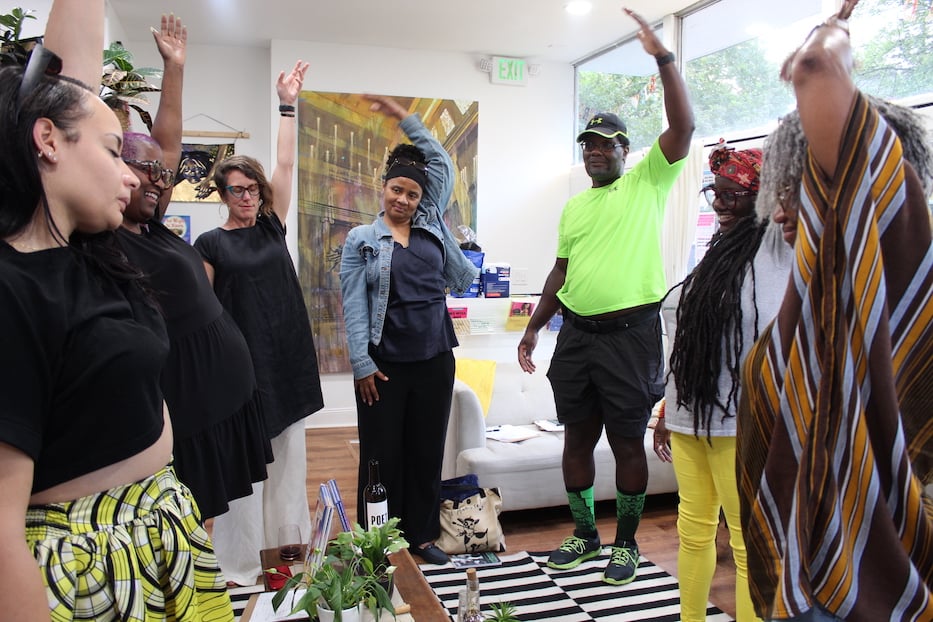
The evening also included embodied practice. Danielle Campbell Photos.
Just off Edgewood Avenue, Possible Futures was quiet enough to hear a pin drop. Inside, Candace Cox sat for a moment, letting a new writing prompt settle in. If she had a chance to speak with American revolutionary Fred Hampton, what would she say to him? What if their conversation came this summer, on the eve of his 75th birthday?
Hampton, a Black Panther leader who was assassinated at 21, never got to see his 70s. Now, Cox is among the writers, readers, and artists helping New Haven remember his legacy as his birth date draws near.
That was the scene—and the word—on a recent Monday, as poets and writers gathered at Possible Futures for the latest iteration of “The Fred Hampton Project,” a collaboration among the Edgewood Avenue bookspace and BAMN Books, Kulturally Lit, the 6th Dimension Festival, and several artists and educators across the state. Monday’s poetry workshop was the third in a series with Enfield Poet Laureate Nzima Hutchings, chief executive officer and founder of Hartford’s L.I.T.
The project culminates on Wednesday Aug. 30, on what would have been Hampton’s 75th birthday, at 318 Edgewood Ave. Curated by Possible Futures and the 6th Dimension Festival, it will include a four-hour celebration, free breakfast at suppertime, and birthday bash beginning at 5 p.m. RSVP for that here.
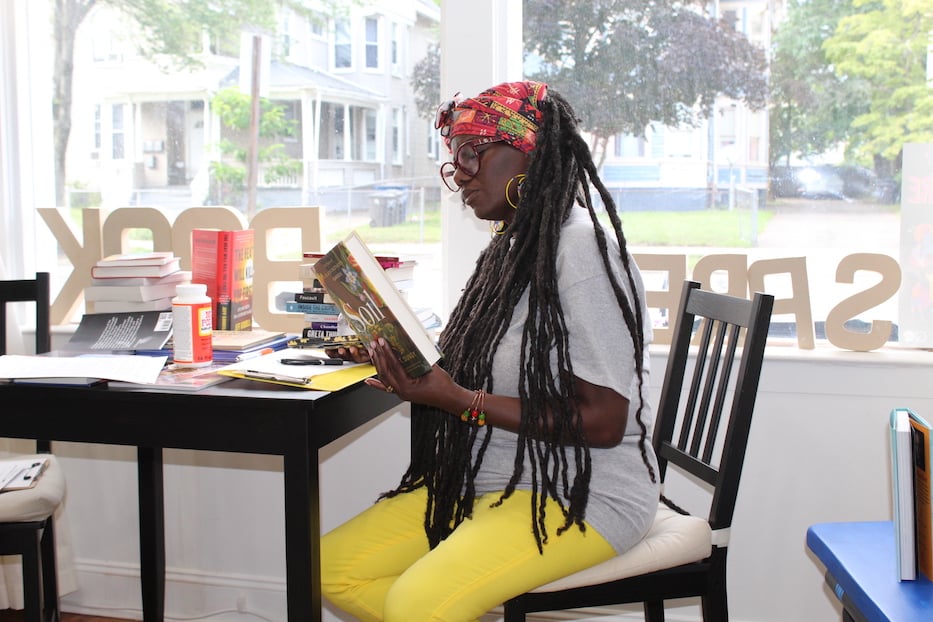
Poet Nzima Hutchings. “Can we have personal peace in our minds?”
“Can we have personal peace in our minds?” Hutchings said, setting the tone for an emotional and at times candid workshop Monday. “Can we have personal peace in our walk? You know, boundaries. When we have that space that really says, ‘I’m here for real.’ If we move with a facade or without having something to stand for, [without] being organic, people never know who they met.”
Around her, energy buzzed through the air, as if it could sense that sweet spot where past and future meet and mingle. Nearby, bookspace founder Lauren Anderson introduced the Little Book of Big Quotes: Fred Hampton and Assata Shakur, as a sort of precursor to the multiple discussions, poems and journal entries that were about to follow. Currently, members of a book club that meets at the space are reading it.
Then, as if conducting a small, poetic ballet, Hutchings introduced the day’s prompts, with time set aside for freewriting. “What do you stand for?” she asked. “What does freedom look like to you?” Minutes later, she turned toward Hampton’s upcoming birthday, and the mark he has left on Black history since his passing over 50 years ago.
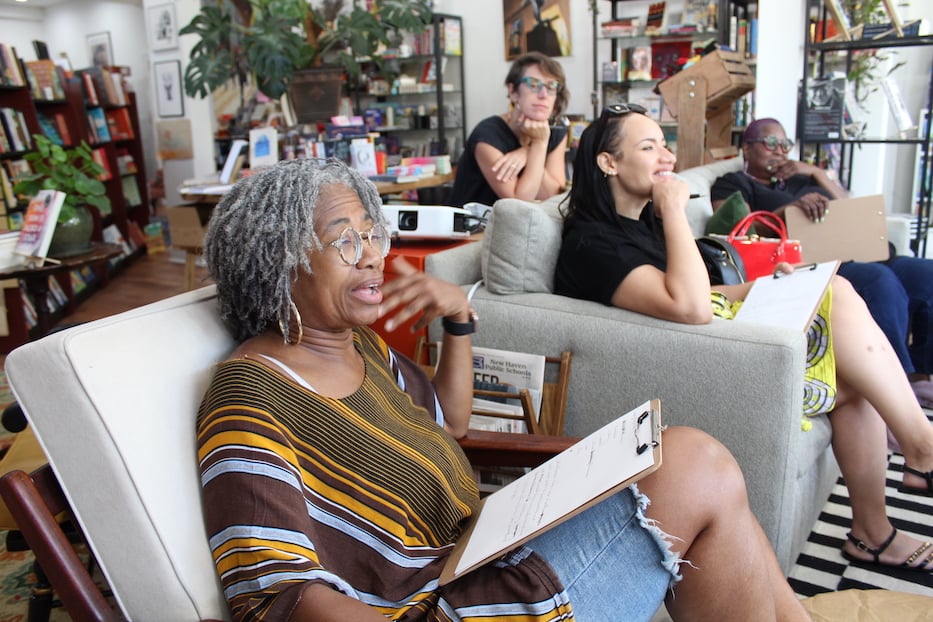
IfeMichelle Gardin.
She imagined a world in which his struggle for Black liberation had not ended so prematurely. What would attendees say to Hampton for his 75th rotation around the sun?
On one side of the room, lifelong New Haveners Babz Rawls-Ivy and IfeMichelle Gardin began to write down their thoughts, letting the relative stillness of the room double as their muse. At some point, dinner arrived, and the fragrance of Iraqi food from the Westville restaurant Rawa floated through the space. Glasses of Lost Poet wine flowed and attendees nibbled and sipped as they wrote.
From where she sat, Cox worked on a piece that later spurred inspiration around the room. A recent transplant to New Haven, she got personal: She thought about what she would want someone to say to her for her own 75th birthday. It gave her an opening to talk about Hampton in a way that felt genuine, she later said.
Many of the attendees shared that feeling throughout the workshop. Around the space, a sanctuary of a bookstore that turns one year old this month, some were initially hesitant to share their poems because they were not “finished.” Hutchings encouraged people to accept the group as a “brave space” and read without the fear of judgment.
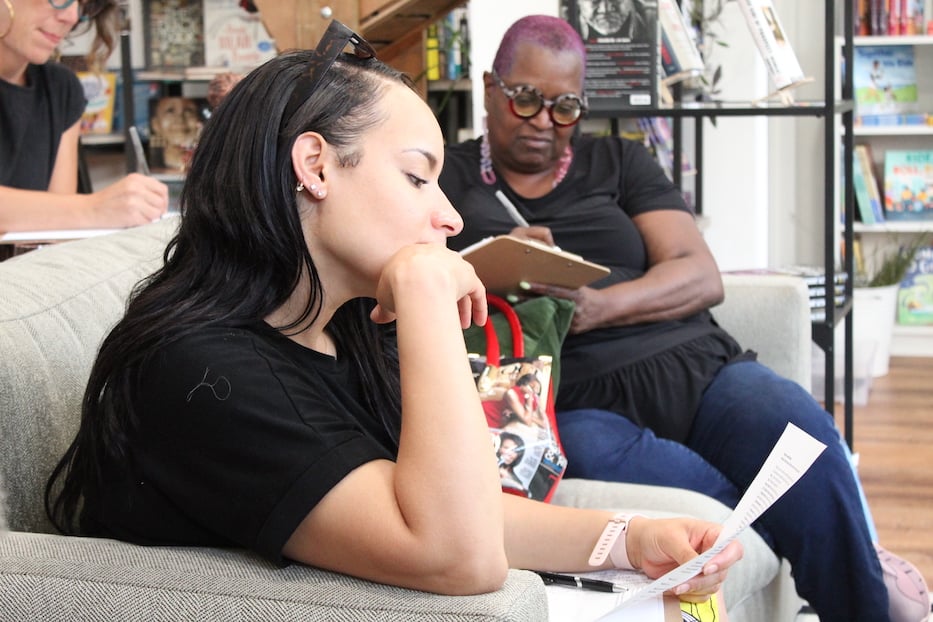
Anderson’s first line—How do you say happy birthday to a star?—was the beginning to a piece that both honored the fallen revolutionary and made space for the grief of a life cut so short. For his vision for Black liberation, Hampton was drugged and murdered by the U.S. government, specifically the Federal Bureau of Investigation (FBI) and the Chicago Police. She mourned that world, and also celebrated that he lived in it, and in so doing made it a better place.
Paired with Cox’s own response, the poem was a starting place for others. Gardin, who is the founder of Elm City LIT Fest and Kulturally Lit, said that she hopes (and imagines) that on her own 75th birthday, her loved ones will say she lives in and with purpose, has worked to create a legacy and loves both her culture and a good celebration. If she were turning 75, Anderson said, she’d want to be known for hustle, heart, and humility above all.
“There are things I want them to say,” chimed in producer Halima Flynn, who worked most recently on Long Wharf Theatre’s film I Am: Muslim/American. “That I know will never be. Some ships have sailed.”
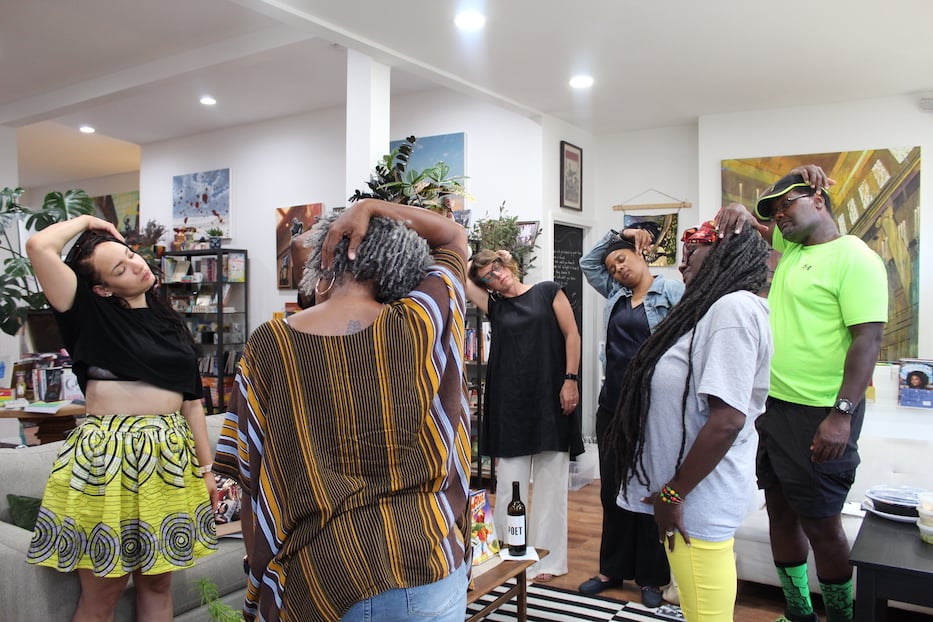
This brought the room into a moment of deep reflection. David Joyner, who had joined the group midway through dinner, listened for a long time before saying anything. The only man in the room, he finally added that he would want to be known at 75 as respectful, kind, and altruistic, lending a helping hand in the community.
Multiple attendees also mentioned change, transformation, and acceptance. Between their age and multiple identities, they pointed to mental health and wellness, personal boundaries, and protecting their peace—as well as change within themselves and their situations. At the end of the session, Cox said she was still deep in thought.
“I learned something new because this is very hard,” she said, “Opening up and sharing me with the world. Sharing with the world is very new, but what I was sharing with the world is knowing that I live my truth, and being in my truth is one of the greatest seeds I took to plant.”